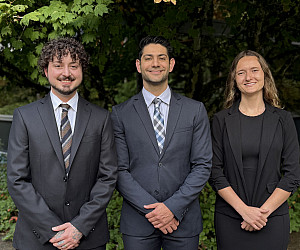Criminal Justice Reform Clinic removes barriers for incarcerated individuals


The Criminal Justice Reform Clinic (CJRC) continues its work to seek release for incarcerated individuals through its Parole Project.
The Parole Project represents incarcerated individuals at different types of parole hearings including “murder review hearings.” For those who are convicted of aggravated murder or murder and are sentenced to life with the possibility of parole, they go before the Oregon Board of Parole (“the Board”) after serving their mandatory minimum sentences. Those who are sentenced to life with the possibility of parole are not guaranteed release.
The Parole Board assigns cases to the CJRC, and incarcerated individuals and families also request clinic representation directly. Each semester, the CJRC usually takes on at least two murder review hearings. At the murder review hearing, the CJRC’s role is to show that their client will be rehabilitated within a reasonable period of time. In order to do so, under Professor Kaplan and Parole Project staff attorney Mieke de Vrind, law students spend the semester preparing for the hearing by interviewing their clients, researching the law, and drafting a memorandum to the Board. Law students are also responsible for representing the client at the hearing in front of the Board.
Maggie Powers ’21 shared their experience working with the clinic. “Working with clients who have been incarcerated for decades and who are survivors of the trauma of violence inherent in the penal system, illuminated the true role of a lawyer for me. What leads individuals to prison is not anything intrinsic about themselves. People are not inherently violent or criminal. The conditions of society - racism, poverty, mental illness, substance use disorder, and trauma to name just a few - create the conditions that lead individuals to commit crimes.”
In addition to its work on the hearings, the CJRC is in the early stages of examining Oregon’s parole system by working with researchers from Portland State University specifically looking at patterns in release decisions and areas of the process that need to be reformed. Special attention will be given to differences in gender and race/ethnicity of the parolees and subsequent outcomes of decisions and supervisions.
“As an attorney, I want to not only provide trauma-informed and empathic legal services to clients, but I also want to change the causes and conditions that incarcerate individuals,” Powers shared.
Law Communications is located in room 304 of Legal Research Center (LRC) on the law Campus.
MSC: 51
email jasbury@lclark.edu
voice 503-768-6605
Cell: 626-676-7923
Assistant Dean,
Communications and External Relations, Law School
Judy Asbury
Law Communications
Lewis & Clark Law School
10101 S. Terwilliger Boulevard MSC 51
Portland OR 97219
More Stories

Comparative Report to Curb the Expansion of Industrial Animal Agriculture
The analysis of how courts are addressing industrial animal agriculture in four countries is the first of its kind from the Farmed Animal Protection Project of the Center of Animal Law Studies (CALS).

Year in Review
Top Stories of 2025
As the calendar year draws to a close, we’ve compiled a sampling of top stories from the undergraduate college, the graduate school, and the law school.

Justice for Animals and the Environment on a Global Scale
The law school’s Global Law Alliance is helping to advance environmental and wildlife protections across the globe while giving students hands-on experience in international law.

2025-2026 Multnomah Bar Association Fellows Announced
Three 1ls were named as Multnomah Bar Association Fellows: Finn Johnson, Hooman Dadkho, and Christina Smith
